ILGA-Europe Rainbow Map Points To Make-or-Break Moment for LGBTI Rights in Europe

In light of the COVID-19 crisis, the annual ILGA-Europe Rainbow Map shows we have come to a pivotal moment for LGBTI people’s human rights in the region.
Published today, May 14, 2020, the ILGA-Europe Rainbow Map and Index reveals that once-leading countries in Europe are falling behind in their commitments to equality for LGBTI people. Combined with the COVID-19 pandemic, which disproportionately affects the most vulnerable and is being used by some governments as an excuse to advance their agendas to curtail human rights, the Map’s findings identify a make-or-break moment for LGBTI equality in Europe.
Key findings of the Rainbow Map 2020 include:
- There has been no positive change in 49% of countries
- For the second year in a row, countries are moving backwards on the Rainbow Index, as existing protections are disappearing
- Trans rights are where most of the current movement in terms of LGBTI equality is happening, for better or worse.
- Other forward movement, although on a smaller scale, is in the inclusion of equality measures protecting intersex people against discrimination
- Regression is most visible where civil and political rights are eroded: LGBTI human rights defenders increasingly at risk, authorities taking active measures to undermine civil society associations, and attempts to ban public events
According to Executive Director of ILGA-Europe, Evelyne Paradis: “This is a critical time for LGBTI equality in Europe. With each year passing, more and more countries, including champions of LGBTI equality, continue to fall behind in their commitments to equality for LGBTI people, while more governments take active measures to target LGBTI communities. History shows that those who are vulnerable before a crisis only become more vulnerable after a crisis, so we have every reason to worry that political complacency, increased repression and socio-economic hardship will create a perfect storm for many LGBTI people in Europe in the next few years.”
“Our call to put high political priority on LGBTI equality has never been more pressing. The results of this year’s Rainbow Map show that equality measures are falling through the cracks in several countries, not because of lack of political and public support but because of widespread complacency about the need for LGBTI equality measures. Fewer and fewer decision-makers are picking up the mantle to see important pieces of legislation through and keep political momentum, so processes are stalling or not being followed up. There are reasons to be extremely worried that this situation will spread as political attention is immersed in the economic fall-out of COVID-19.”
Amidst overall stagnation and regression, advances continue to be made on trans and intersex rights. Indeed, most of the positive changes reported this year take place in countries which included gender identity and sex characteristics in equality laws (as was the case in Andorra, Belgium, the Netherlands, North Macedonia, and Switzerland) and adopted new legal gender recognition (LGR) legislation which respects the principle of self-determination (Iceland) and gives minors access to LGR (Spain). However, in an increasing number of countries, LGR legislative measures are being stalled (Albania, Cyprus, Finland and Sweden), including in the context of a hostile climate on trans rights fuelled by opposition groups, as was the case in the UK. A number of countries are also losing points this year (namely Hungary, Azerbaijan, Serbia, and the UK) because existing administrative and legal procedures that allow for name or gender marker change in official documents for trans people are not effective in practice.
According to Viima Lampinen, Co-chair of the ILGA-Europe Executive Board: “The news that more governments are adopting laws that protect trans, intersex and non-binary people must be read with extreme caution. Targeted attacks on trans rights by opposition groups have been observed in an increasing number of countries across the region, especially transphobic speech fuelled online. The safety and wellbeing of trans communities in Europe remains precarious and only made more fragile by governments’ responses to the current pandemic, which is affecting these communities particularly hard. Trans, intersex and non-binary people need governments to stand strong as vocal allies, taking all necessary steps to secure their rights in law and in practice, and taking their needs into consideration in their COVID-19 responses.”
The 11th ILGA-Europe Rainbow Map is published at an unprecedented time in the world, during which vulnerable minorities, including LGBTI people, are particularly affected and the inequalities in our societies have been starkly brought into focus. Along with this, a number of European governments have used the pandemic as an excuse to make aggressive moves against LGBTI and other human rights. This is happening at a time when countries like Poland (dropping to the bottom of the EU ranking) and Turkey are going backwards on the Rainbow Index for having failed to uphold such fundamental freedoms as freedom of assembly, freedom of association and protection of human rights defenders.
Says Darienne Flemington, Co-chair of the ILGA-Europe Executive Board: “Countries like Hungary, Poland, Turkey have been in the spotlight because of their policies targeting LGBTI communities prior to the pandemic. The proposed ban of legal gender recognition in Hungary, proposed laws to ban abortion and sex education in Poland, scapegoating of LGBTI people as the source of the coronavirus by Turkey’s political leaders – these are all alarming signals of how governments with strong authoritarian tendencies are emboldened by the crisis to further limit the rights of vulnerable groups and minorities. If there was ever a time for European governments and institutions to stand firm on the rule of law and human rights, it is now.”
Evelyne Paradis concludes: “Amidst the public health emergency and economic turmoil we are facing, there is a crisis of structural inequality unfolding as well, one that makes the many vulnerable people in our societies even more at risk. In the current climate, it is only more evident that laws and policies are often the last lines of defence for LGBTI communities as other marginalised groups. That’s why it’s never been more important that governments enshrine the protection of LGBTI people into law and take concrete measures to make sure that they can live as who they are in societies that are just, equal and fair.”
The official launch of the ILGA-Europe Rainbow Map and Index 2020 will be broadcast on Facebook Live, May 14 at 3pm CET, with a round-table discussion bringing together panellists from civil society and policy makers.
Executive Summary
Rainbow Europe – ILGA-Europe’s annual benchmarking tool – is comprised of the Rainbow Map and Index and national recommendations. ILGA-Europe have produced the Rainbow Map and Index since 2009, using it to illustrate the legal and policy situation of LGBTI people in Europe.
The Rainbow Map and Index ranks 49 European countries on their respective legal and policy practices for LGBTI people, from 0-100%.
In order to create our country ranking, ILGA-Europe examine the laws and policies in 49 countries using a set of 69 criteria – divided between six thematic categories: equality and non-discrimination; family; hate crime and hate speech; legal gender recognition and bodily integrity; civil society space; and asylum. More information on the list of criteria and their weight on the total score can be found at www.rainbow-europe.org/about
Rainbow Europe 2020 individual criteria and the percentage ‘weight’ assigned to them remain exactly the same as the 2019 version, meaning that it is easier than ever before to compare a country’s momentum or regression on LGBTI equality laws.
Policymakers, researchers and journalists are able to go ‘behind’ the points and see the original information sources that we base our Map and Index ranking on. This additional layer of information is available through our updated Rainbow Europe web module, www.rainbow-europe.org.
The Rainbow Map and Index presents a picture of what the policy landscape is like right now, while our country-specific recommendations attempt to answer the question “what’s next?” These recommendations for national policymakers are intended to encourage policymakers to address the most pressing legal and policy priorities within the framework of our Rainbow Map and Index. The recommendations were gathered following an online consultation with a wide range of LGBTI organisations in the various countries. As a result, the recommendations are tailored to the needs of activists working on the ground.
| TOP 5, Rainbow Europe 2020 | BOTTOM 5, Rainbow Europe 2020 |
| 1. Malta (89%) | 45. Monaco (11%) |
| 2. Belgium (73%) | 46. Russia (10%) |
| 3. Luxembourg (73%) | 47. Armenia (8%) |
| 4. Denmark (68 %) | 48. Turkey (4 %) |
| 5. Norway (68%) | 49. Azerbaijan (2%) |
For the fifth year in a row, Malta continues to occupy the number one spot on the Rainbow Europe Map, with a score of 89%.
Belgium comes second place for the third time with a score of 73%.
Luxembourg receives the same score as Belgium and occupies the third spot on the ranking for the second year in a row.
The three countries at the other end of the Rainbow Europe scale are Azerbaijan (2%), Turkey (4%), and Armenia (8%). Turkey’s score has been decreasing since 2015, due to restrictions on freedom of assembly and association. Azerbaijan has also lost points over the past two years due to irregularities on legal gender recognition.
Hungary is the country with the most dramatic drop in its score, losing 8.46% points in relation to the suspended procedures for legal gender recognition and the lack of proper state protection at public events. Poland has also dropped by 1.9% and is now the lowest EU country on the map.
Another important deduction happened, with France losing 6.80% points due to the expiration of the government’s action plan.
Montenegro, North Macedonia, and the Netherlands were the three countries with the biggest jump in scores. Montenegro announced a comprehensive action plan for the next four years and prohibited discrimination based on sex characteristics. North Macedonia amended its equality and criminal codes, adding sexual orientation and gender identity as protected grounds. In the Netherlands, the Equal Treatment Act was amended with the inclusion of gender identity, gender expression, and sex characteristics grounds.
Equality action plans have expired in Belgium, Finland, and France, while Croatia, Ireland, and Kosovo have shortcomings and implementation problems with their action plans. Serbia and Andorra included sexual orientation and gender identity protection in healthcare legislation. Belgium and the Netherlands were the only countries that recognised ‘sex characteristics’ in their equality laws.
Recognition of family legislation is stagnating across Europe. This year, only Northern Ireland (UK) introduced marriage equality and Monaco recognised the right to cohabitation for same-sex couples (coming into effect on 27 June 2020). Serbia imposed a ban on medically assisted insemination services for people with a history of same-sex relationships.
Court judgements in several countries had groundbreaking effects on the lives of LGBTI people, including Spain’s Constitutional Court’s ruling against the age limit for gender marker change for trans people; Switzerland’s Federal Court decision saying that the Constitution protects ‘gender identity’ under ‘sex/gender’; and Kosovo’s Basic Court decision approving the legal gender recognition of a trans man.
North Macedonia was this year’s only country extending protection from hate crime, amending its Criminal Code to add sexual orientation and gender identity grounds. Switzerland’s referendum approved the inclusion of ‘sexual orientation’ grounds in the Criminal Code.
The right to self-determination for trans people has been recognised only in Iceland with its new Gender Autonomy Act. Legal gender recognition procedures have become more accessible through trans activists’ efforts in Armenia, Cyprus, Kosovo, and Montenegro. The implementation of existing procedures has worsened in Azerbaijan, Georgia, Serbia, Turkey, and Northern Ireland (UK).
Rainbow Europe Map and Index 2020
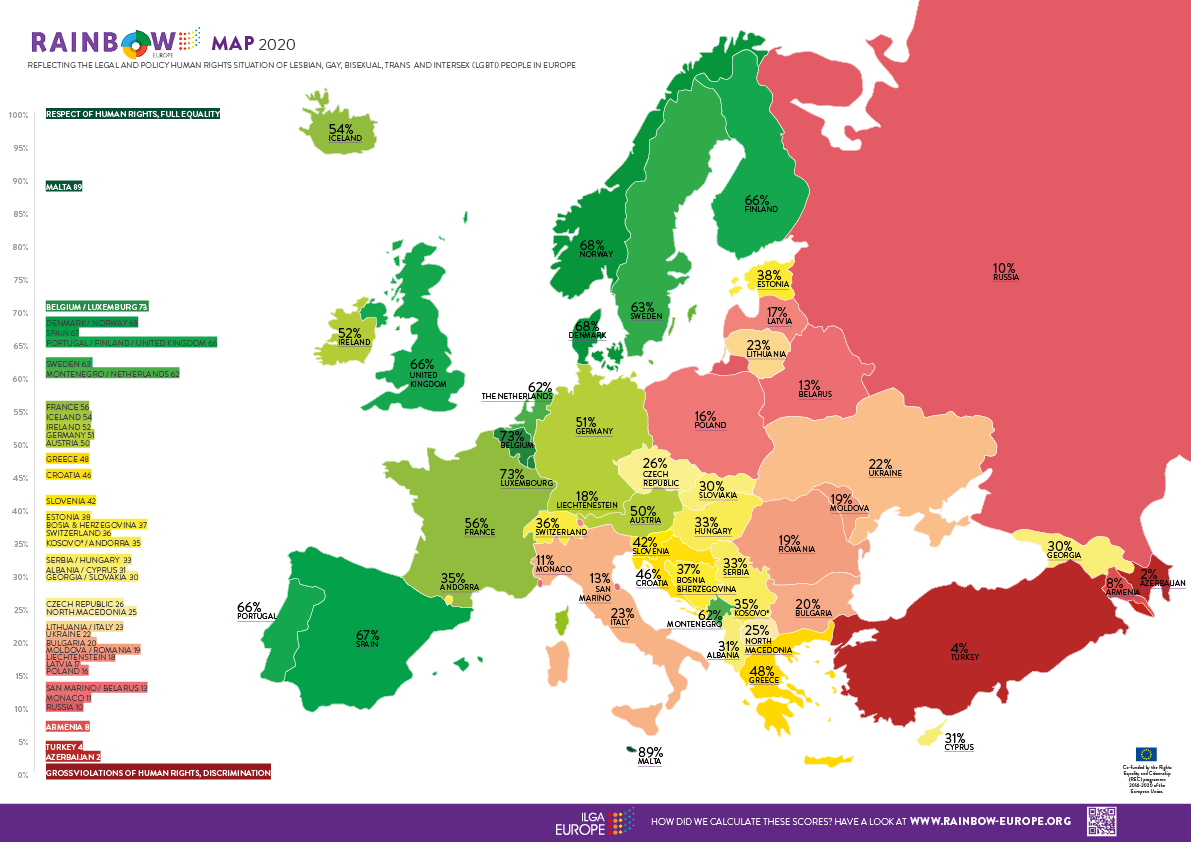
ILGA-Europe Rainbow Map and Index 2020 reveals that once-leading countries in Europe are falling behind in their commitments to equality for LGBTI people.
Key findings of the Rainbow Map 2020 include (as of May 2020):
- There has been no positive change in 49% of countries
- For the second year in a row, countries are moving backwards on the Rainbow Index, as existing protections are disappearing
- Trans rights are where most of the current movement in terms of LGBTI equality is happening, for better or worse.
- Other forward movement, although on a smaller scale, is in the inclusion of equality measures protecting intersex people against discrimination
- Regression is most visible where civil and political rights are eroded: LGBTI human rights defenders increasingly at risk, authorities taking active measures to undermine civil society associations, and attempts to ban public events.
Executive Summary
Rainbow Europe – ILGA-Europe’s annual benchmarking tool – is comprised of the Rainbow Map and Index and national recommendations. ILGA-Europe have produced the Rainbow Map and Index since 2009, using it to illustrate the legal and policy situation of LGBTI people in Europe.
The Rainbow Map and Index ranks 49 European countries on their respective legal and policy practices for LGBTI people, from 0-100%.
In order to create our country ranking, ILGA-Europe examine the laws and policies in 49 countries using a set of 69 criteria – divided between six thematic categories: equality and non-discrimination; family; hate crime and hate speech; legal gender recognition and bodily integrity; civil society space; and asylum. More information on the list of criteria and their weight on the total score can be found at www.rainbow-europe.org/about
Rainbow Europe 2020 individual criteria and the percentage ‘weight’ assigned to them remain exactly the same as the 2019 version, meaning that it is easier than ever before to compare a country’s momentum or regression on LGBTI equality laws.
Policymakers, researchers and journalists are able to go ‘behind’ the points and see the original information sources that we base our Map and Index ranking on. This additional layer of information is available through our updated Rainbow Europe web module, www.rainbow-europe.org.
The Rainbow Map and Index presents a picture of what the policy landscape is like right now, while our country-specific recommendations attempt to answer the question “what’s next?” These recommendations for national policymakers are intended to encourage policymakers to address the most pressing legal and policy priorities within the framework of our Rainbow Map and Index. The recommendations were gathered following an online consultation with a wide range of LGBTI organisations in the various countries. As a result, the recommendations are tailored to the needs of activists working on the ground.
| TOP 5, Rainbow Europe 2020 | BOTTOM 5, Rainbow Europe 2020 |
| 1. Malta (89%) | 45. Monaco (11%) |
| 2. Belgium (73%) | 46. Russia (10%) |
| 3. Luxembourg (73%) | 47. Armenia (8%) |
| 4. Denmark (68 %) | 48. Turkey (4%) |
| 5. Norway (68%) | 49. Azerbaijan (2%) |
For the fifth year in a row, Malta continues to occupy the number one spot on the Rainbow Europe Map, with a score of 89%.
Belgium comes second place for the third time with a score of 73%.
Luxembourg receives the same score as Belgium and occupies the third spot on the ranking for the second year in a row.
The three countries at the other end of the Rainbow Europe scale are Azerbaijan (2%), Turkey (4%), and Armenia (8%). Turkey’s score has been decreasing since 2015, due to restrictions on freedom of assembly and association. Azerbaijan has also lost points over the past two years due to irregularities on legal gender recognition.
Hungary is the country with the most dramatic drop in its score, losing 8.46% points in relation to the suspended procedures for legal gender recognition and the lack of proper state protection at public events. Poland has also dropped by 1.9% and is now the lowest EU country on the map.
Another important deduction happened, with France losing 6.80% points due to the expiration of the government’s action plan.
Montenegro, North Macedonia, and the Netherlands were the three countries with the biggest jump in scores. Montenegro announced a comprehensive action plan for the next four years and prohibited discrimination based on sex characteristics. North Macedonia amended its equality and criminal codes, adding sexual orientation and gender identity as protected grounds. In the Netherlands, the Equal Treatment Act was amended with the inclusion of gender identity, gender expression, and sex characteristics grounds.
Equality action plans have expired in Belgium, Finland, and France, while Croatia, Ireland, and Kosovo have shortcomings and implementation problems with their action plans. Serbia and Andorra included sexual orientation and gender identity protection in healthcare legislation. Belgium and the Netherlands were the only countries that recognised ‘sex characteristics’ in their equality laws.
Recognition of family legislation is stagnating across Europe. This year, only Northern Ireland (UK) introduced marriage equality and Monaco recognised the right to cohabitation for same-sex couples (coming into effect on 27 June 2020). Serbia imposed a ban on medically assisted insemination services for people with a history of same-sex relationships.
Court judgements in several countries had groundbreaking effects on the lives of LGBTI people, including Spain’s Constitutional Court’s ruling against the age limit for gender marker change for trans people; Switzerland’s Federal Court decision saying that the Constitution protects ‘gender identity’ under ‘sex/gender’; and Kosovo’s Basic Court decision approving the legal gender recognition of a trans man.
North Macedonia was this year’s only country extending protection from hate crime, amending its Criminal Code to add sexual orientation and gender identity grounds. Switzerland’s referendum approved the inclusion of ‘sexual orientation’ grounds in the Criminal Code.
The right to self-determination for trans people has been recognised only in Iceland with its new Gender Autonomy Act. Legal gender recognition procedures have become more accessible through trans activists’ efforts in Armenia, Cyprus, Kosovo, and Montenegro. The implementation of existing procedures has worsened in Azerbaijan, Georgia, Serbia, Turkey, and Northern Ireland (UK).
10th Rainbow Europe: Confirmed stagnation and regression on LGBTI equality calls for immediate action
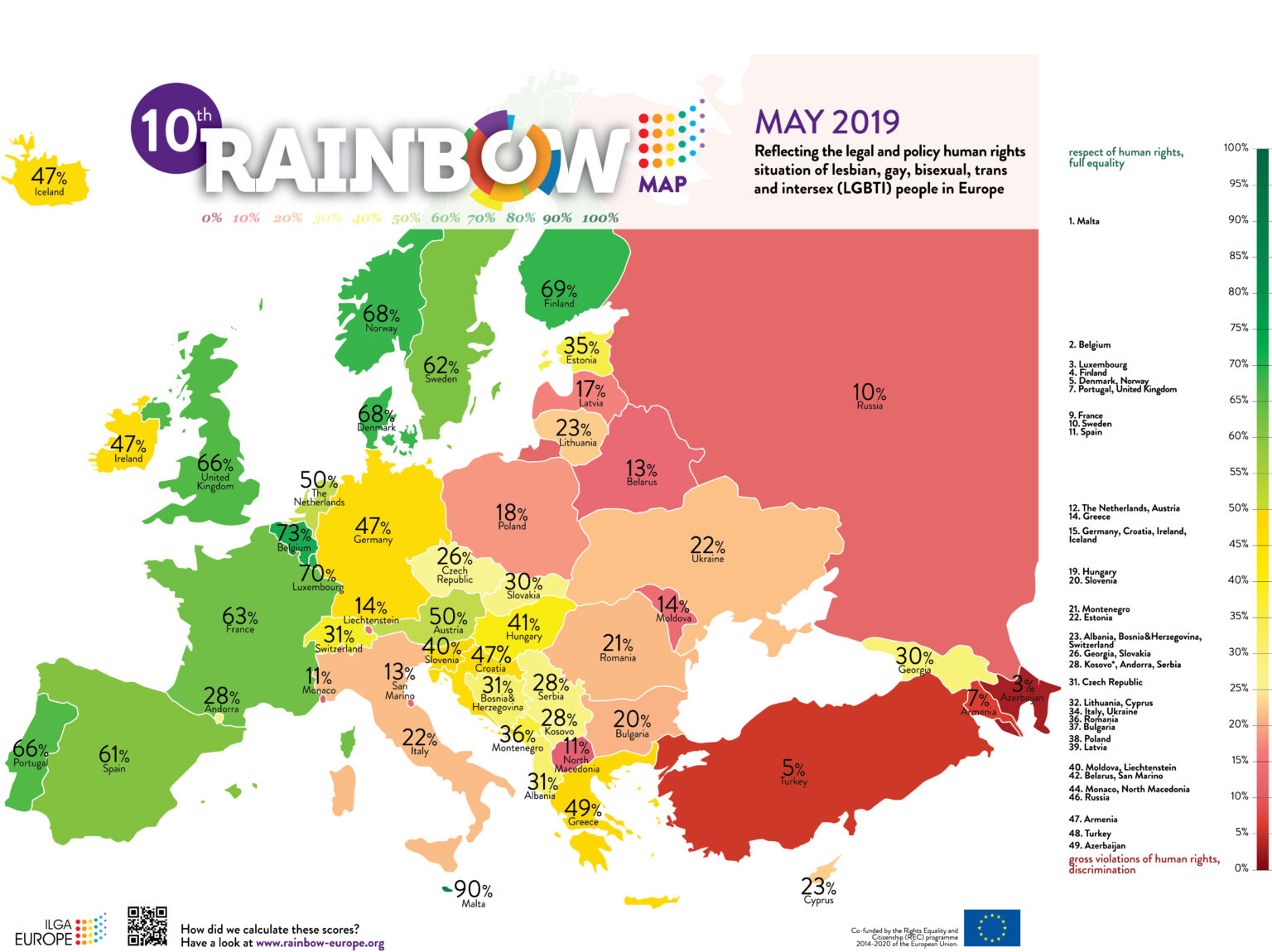
Rainbow Europe 2019 reveals not only a standstill in a significant number of European countries but a visible backslide on laws and policies safeguarding equality and human rights of lesbian, gay, bisexual, trans and intersex (LGBTI) people.
Officially unveiled today in Oslo (13 May 2019) at the annual intergovernmental Forum marking the International Day against Homophobia, Biphobia, Transphobia, and Interphobia (IDAHOBIT), the 2019 Rainbow Europe Map is sending an unequivocal message to national governments and European institutions alike: we can no longer ignore to the backlash!
Decline is indeed clearly noticeable on this year’s Rainbow Map, ILGA-Europe’s annual benchmarking tool, which ranks 49 countries in Europe on their LGBTI equality laws and policies. For the first time in the Index’s ten-year history, countries are moving backwards as existing laws and policies disappeared: Poland no longer provides access to medically assisted reproduction for single women, while Bulgaria removed all their administrative and legal procedures for changing name or gender marker in the official documents for trans people. Serbia and Kosovo did not renew their equality action plans. Bulgaria, Hungary and Turkey are countries which slide back on the ranking because of their governments’ failure to uphold fundamental civil and political rights such as freedom of assembly, freedom of association and protection of human rights defenders over the past year. The result is an increasingly unsafe and unsustainable environment for LGBTI organisations and human rights defenders in a growing number of countries.
“If ever there was a time to put high political priority on LGBTI equality, it is now! Last year, we warned about the dangers of thinking that the work was done. Sadly, this year, we see concrete evidence of roll-back at political and legislative levels in a growing number of countries. There is no more time to waste. In the current increasingly polarised social and political climate, laws and policies are often the last lines of defence for LGBTI communities. That’s why we need national and European decision-makers to redouble efforts to secure equality in law and in practice for LGBTI people.”
EVELYNE PARADIS, EXECUTIVE DIRECTOR, ILGA-EUROPE
The 2019 Rainbow Europe also tells the story of an evolving movement. The 10th edition of the Index introduces changes in the weight given to different issues it captures. As a result, it gives a more accurate picture of what LGBTI people really need and what matters to the lives of different parts of the LGBTI communities. The message is clear: for our movement in Europe, equality and non-discrimination laws, legal gender recognition, bodily integrity, protection from hatred and violence, and family rights are all interconnected and equally essential for the full enjoyment of human rights for LGBTI people.
“For years, we have said that marriage equality was an important signifier of equality, but not the be-all and end-all for LGBTI people. What is also crucial for our communities are effective laws to recognise rights of trans people to self-determination, robust protection against LGBTI-phobic violence and speech, equal access to reproductive rights, and prohibiting medical intervention on intersex children. Our revised index makes this fact clearer now. The countries that are expanding their legislative horizons to embrace this vision of equality for LGBTI people are the ones moving ahead. We are heartened to continue to see examples of governments demonstrating leadership in this direction, as Luxembourg and Finland did over the past year.”
MICAH GRZYWNOWICZ, CO-CHAIR, ILGA-EUROPE EXECUTIVE BOARD
Over the last 10 years, the legal and human rights situation of LGBTI people has dramatically changed and the patterns on the Map have started to show different stories year after year. Every year, some countries surprise us by taking significant steps towards the best existing standards, leaving other countries, once known to lead on LGBTI equality, further behind.
“To all governments who are serious about LGBTI equality, consider Rainbow Europe to be your roadmap! We know what is needed and the formula for success is obvious: Laws and explicit policies matter. Political leadership matters. Add to this mix meaningful engagement with communities and civil society and you can make a real difference in the lives of LGBTI people.”
DARIENNE FLEMINGTON, CO-CHAIR, ILGA-EUROPE EXECUTIVE BOARD
Rainbow Europe 2019 – executive summary
Rainbow Europe – ILGA-Europe’s annual benchmarking tool – is comprised of the Rainbow Map & Index. ILGA-Europe have produced the Rainbow Map&Index since 2009, using it to illustrate the legal and policy situation of LGBTI people in Europe.
The Rainbow Map & Index ranks 49 European countries on their respective legal and policy practices for LGBTI people, from 0-100%.
| Top 3 on Country Ranking | Bottom 3 on Country Ranking |
| 1. Malta 90% | 47. Armenia 7% |
| 2. Belgium 73% | 48. Turkey 5% |
| 3. Luxembourg 70% | 19. Azerbaijan 3% |
For the fourth year in a row, Malta (90%) appears at the top of the Rainbow Europe country ranking. Belgium got the second place for the second time with their score 73%. Luxembourg now occupies third place (70%) – this is a rise of seventeen places (20th position in May 2018), mainly fuelled by the well-modified legal gender recognition law based on self-determination and a comprehensive national action plan. The three countries at the other end of the Rainbow Europe scale are Azerbaijan (3%), Turkey (5%), and Armenia (7%) completing the list of 49 countries. Turkey’s place has been decreasing since 2015.
In order to create our country ranking, ILGA-Europe examine the laws and policies in 49 countries using a set of criteria – from May 2019, the number of individual criteria used rises to 69. These criteria are divided between six thematic categories: equality and non-discrimination; family; hate crime and hate speech; legal gender recognition and bodily integrity; civil society space; and asylum.
Alterations to our criteria make year-on-year comparisons difficult but certain lessons are clear – countries that are expanding their legislative horizons are moving ahead.
ILGA-Europe are also very proud to announce that policymakers, researchers and journalists are able to go ‘behind’ the dots and see the original information sources that we base our Map and Index ranking on. This additional layer of information is available through our updated Rainbow Europe web module, www.rainbow-europe.org.
The Rainbow Map & Index presents a picture of what the policy landscape is like right now, while our country-specific recommendations attempt to answer the question “what’s next?” These recommendations for national policymakers are intended to encourage policymakers to address the most pressing legal and policy priorities within the framework of our Rainbow Map & Index.
While ILGA-Europe are urging national authorities to follow these recommendations, we did not come up with the suggestions unilaterally. The recommendations were gathered following an online consultation with a wide range of LGBTI organisations in the various countries. As a result, the recommendations are tailored to the needs of activists working on the ground.
Rainbow Europe Map and Index 2019
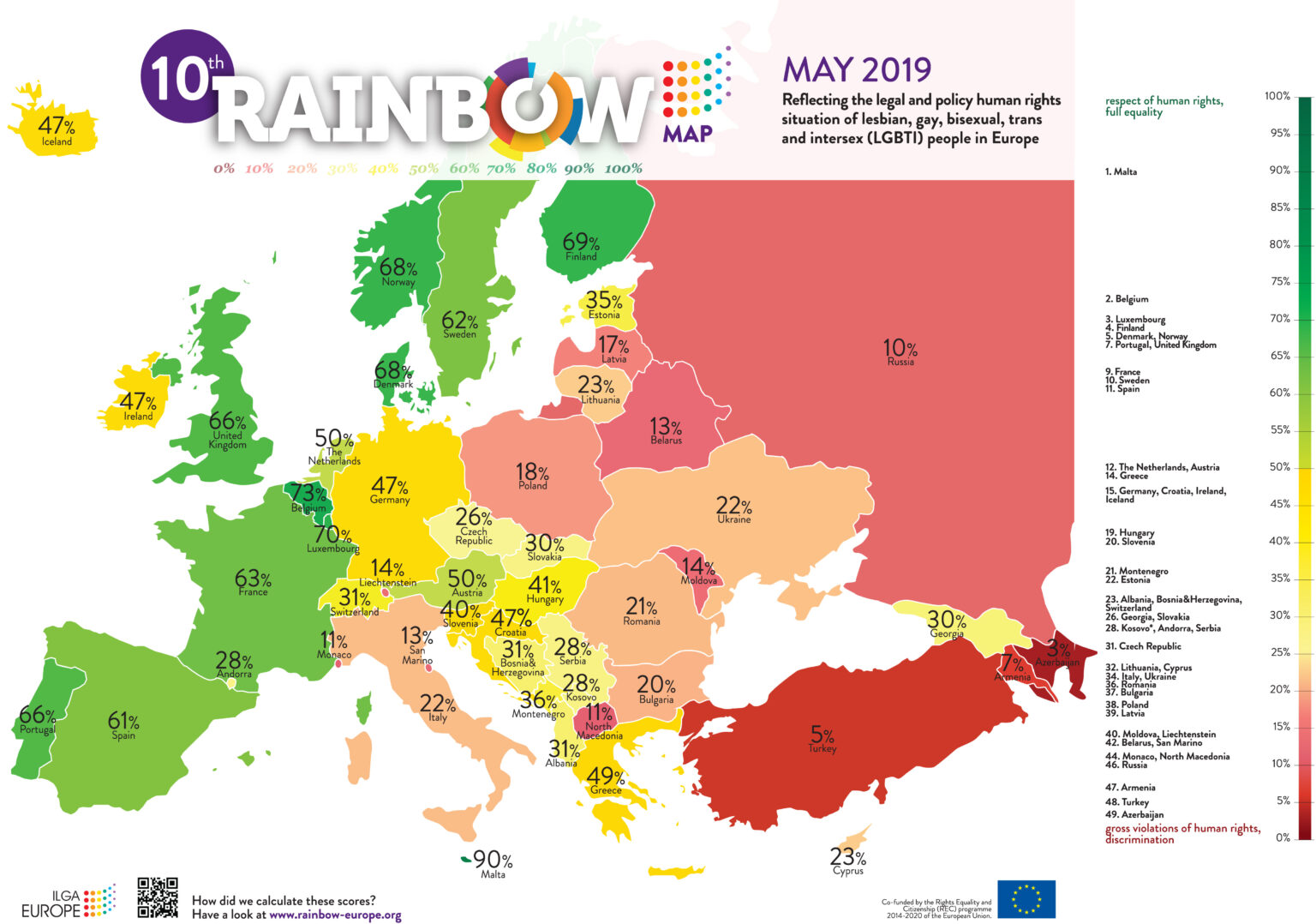
ILGA-Europe’s annual benchmarking tool, which ranks 49 countries in Europe on their LGBTI equality laws and policies, reveals not only a standstill but a visible backslide on laws and policies safeguarding equality and human rights of LGBTI people.
Decline is indeed clearly noticeable on this year’s Rainbow Map. For the first time in the Index’s ten-year history, countries are moving backwards as existing laws and policies disappeared: Poland no longer provides access to medically assisted reproduction for single women, while Bulgaria removed all their administrative and legal procedures for changing name or gender marker in the official documents for trans people.
Serbia and Kosovo did not renew their equality action plans. Bulgaria, Hungary and Turkey are countries which slide back on the ranking because of their governments’ failure to uphold fundamental civil and political rights such as freedom of assembly, freedom of association and protection of human rights defenders over the past year.
The result is an increasingly unsafe and unsustainable environment for LGBTI organisations and human rights defenders in a growing number of countries.
The 2019 Rainbow Europe also tells the story of an evolving movement. The 10th edition of the Index introduces changes in the weight given to different issues it captures. The message is clear: for our movement in Europe, equality and non-discrimination laws, legal gender recognition, bodily integrity, protection from hatred and violence, and family rights are all interconnected and equally essential for the full enjoyment of human rights for LGBTI people.
The Rainbow Map&Index presents a picture of what the policy landscape is like right now, while our Recommendations attempt to answer the question “what’s next?” These country-spesific recommendations for national policymakers are intended to encourage policymakers to address the most pressing legal and policy priorities within the framework of our Rainbow Map&Index.
Rainbow Europe 2018 is a wake-up call for anyone who cares about LGBTI equality
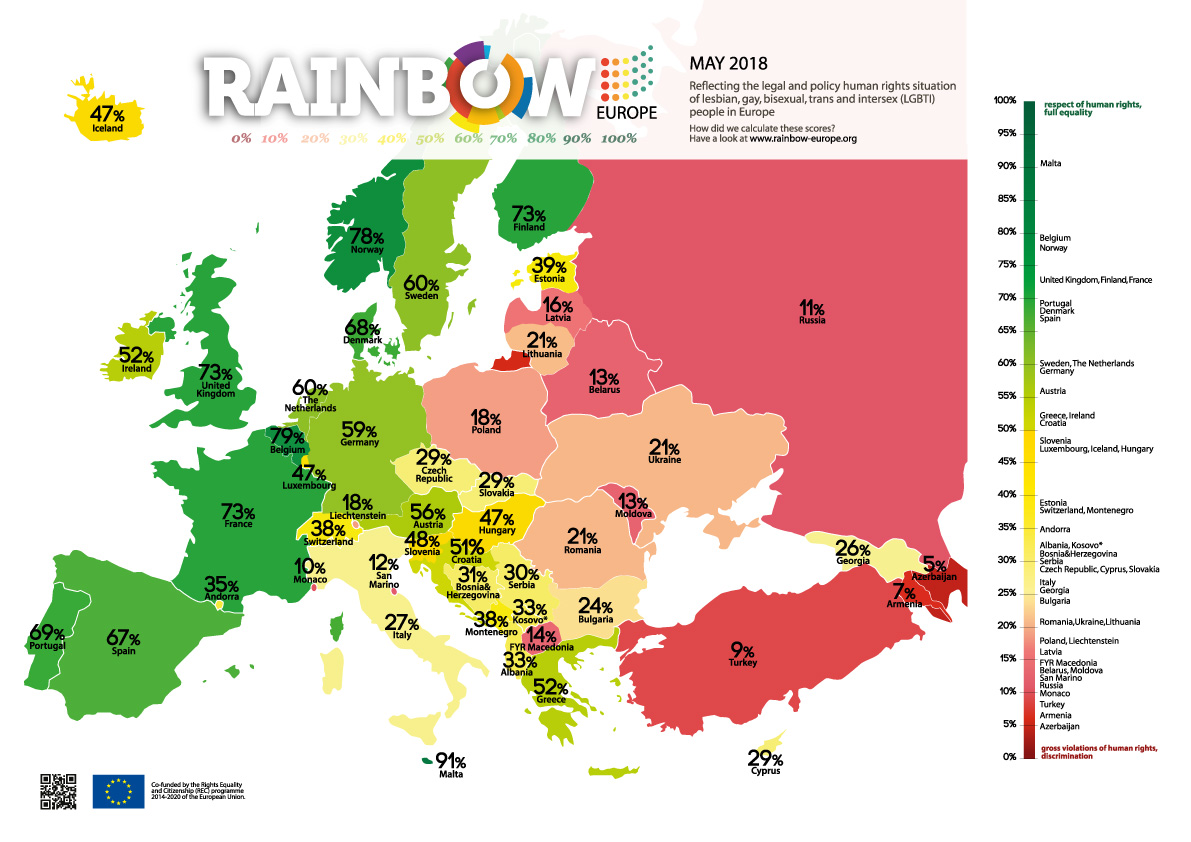
The 2018 Rainbow Europe package, launched by ILGA-Europe today, provides real evidence that progress on LGBTI equality law and policy is slowing down in Europe.
The 2018 Rainbow Europe Map and Index reveal that fewer countries are moving up the country ranking; many are stagnating, including countries that are traditionally perceived as equality ‘frontrunners’. ILGA-Europe’s annual benchmarking tool, which ranks 49 countries in Europe on their LGBTI equality laws and policies, reveals a region where advances are not being made at the rate they once were. This lack of sustained progress on LGBTI equality issues should set off alarm bells for policymakers and advocates alike.
“Against a backdrop of backlash on human rights across Europe, how can states possibly think the work on LGBTI equality is finished?” said ILGA-Europe Executive Director Evelyne Paradis. “The incredible achievements of the past decade are at stake. Let’s not make the mistake of thinking that we have achieved equality. There are too many signs that trends like populism and nationalism aren’t political buzzwords – they can have a lasting impact on the lives of LGBTI people in Europe. There are too many signs around us that many of the recent wins are fragile. So let me say it again – we are nowhere near done.”
Unveiled in Lisbon this morning at an intergovernmental Forum in front of high-level government officials, the Rainbow Europe Map is a stark reminder for national governments and European institutions of how easy it is for complacency to set when it comes to enshrining rights firmly in law. Indeed, while Malta continues to feature at number one spot, other countries that are typically viewed as progressive are not among the Map’s frontrunners – including the Netherlands, who have actually dropped outside the Rainbow Europe top 10.
For ILGA-Europe, this stagnation is a worrying picture considering the current political climate of rising levels of populism, nationalism and civil society scapegoating, which have a particularly high negative impact on more vulnerable groups, like LGBTI people.
Joyce Hamilton, co-chair of ILGA-Europe’s Executive Board commented: “Our communities unfortunately know all too well how vulnerable we are to undemocratic tendencies. Law and policies are often the last line of defence for LGBTI people so that is why we insist on making sure our countries’ legislation explicitly protects our human rights.
And this goes for everyone within our communities – ensuring full equality for LGBTI people has never and will not stop at marriage equality! All governments in Europe have to pick up the pace, stick to their commitments and make legal protection a reality for all LGBTI people, particularly trans and intersex people.”
To the politicians in countries with consistently poor Rainbow Europe records and who claim LGBTI equality issues aren’t a priority, ILGA-Europe and our members stand firm:
“Avoiding your responsibility to work for LGBTI equality is not an option for any political leader or government official in 2018. Now is the time for them to show leadership by fully backing policies that make equality an everyday reality for the people they serve. Across Europe, the only way for policymakers to protect the great LGBTI equality advances of the last two decades is to build on them and commit necessary resources to ensure that the everyday life for LGBTI people is transformed for the better. I
LGA-Europe’s Rainbow Europe package gives policymakers (at every level of the country ranking) very concrete recommendations for where they can start to legislate and make a real impact – and our member organisations throughout the region have even more suggestions. We have all worked hard together for these advances. It’s time now to push hard to make them real for LGBTI communities everywhere.” remarked Brian Sheehan, co-chair of ILGA-Europe’s Executive Board.
Rainbow Europe Map and Index 2018

ILGA-Europe’s annual benchmarking tool, which ranks 49 countries in Europe on their LGBTI equality laws and policies, reveals a region where advances are not being made at the rate they once were. This lack of sustained progress on LGBTI equality issues should set off alarm bells for policymakers and advocates alike.
The 2018 Rainbow Europe Map and Index reveal that fewer countries are moving up the country ranking; many are stagnating, including countries that are traditionally perceived as equality ‘frontrunners’.
The Rainbow Europe Map ranks 49 European countries on their respective legal and policy practices for LGBTI people, from 0-100%.
The Rainbow Europe 2018 individual criteria and the percentage ‘weight’ assigned to them remain exactly the same as the 2017 version, meaning that it is easier than ever before to compare a country’s momentum (or lack thereof!) on LGBTI equality laws.
Rainbow Europe Map and Index 2017
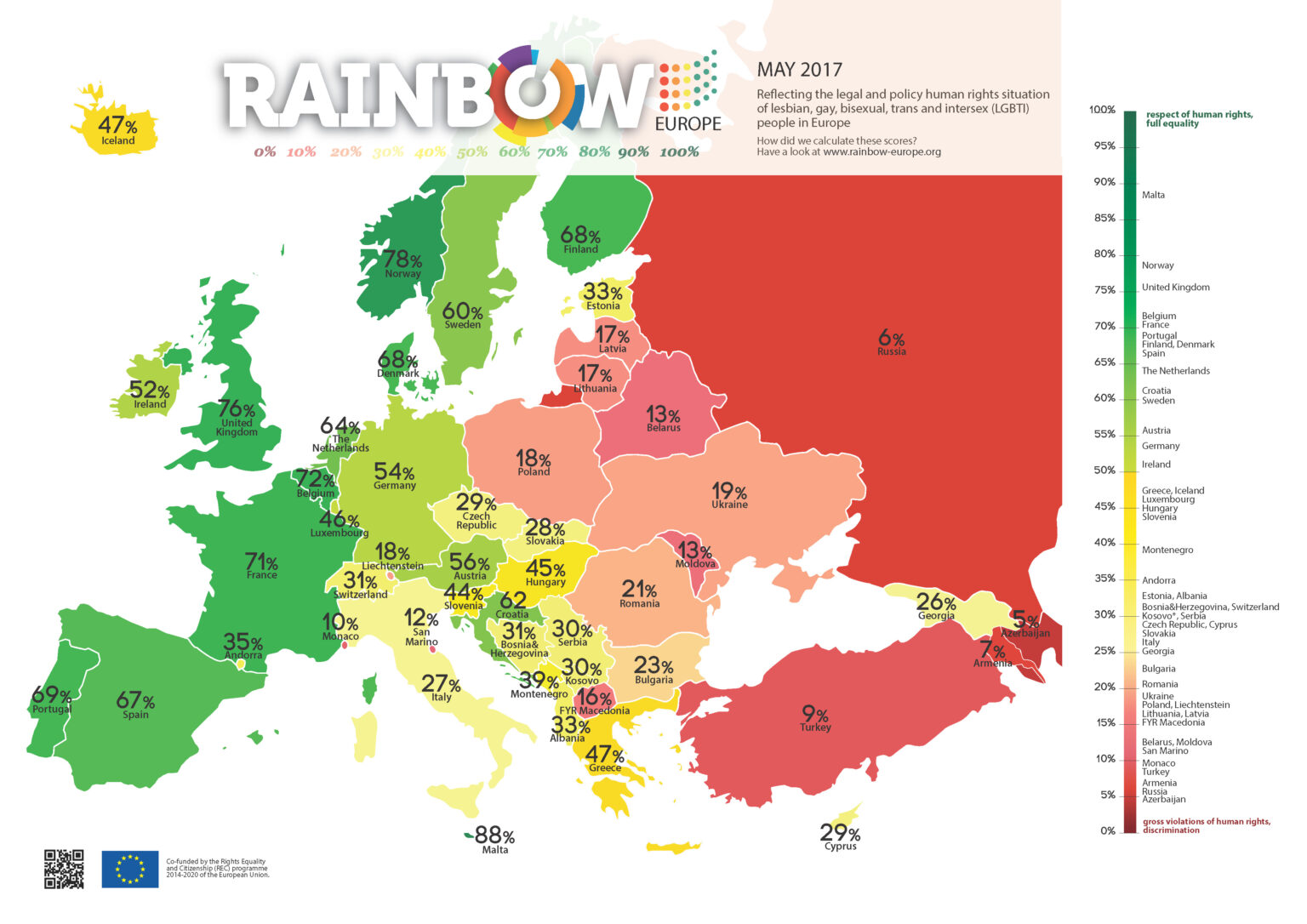
Legal gender recognition in France and Norway. Civil unions in Italy. A ban on conversion therapy in Malta. These are just some of the major developments that made global headlines in 2016. But these attention-grabbing changes are not happening at the same pace all over Europe. There are clearly risks to progress in countries at both ends of the Rainbow Europe country ranking.
“One of the most common questions ILGA-Europe get asked by national governments is how to improve their ranking on the Rainbow Europe Map – the answer is political backbone. Political leaders need to understand that, if they don’t act now, the LGBTI equality gains we’ve all made together over the past few decades can be rolled back.” remarked ILGA-Europe Executive Director, Evelyne Paradis ahead of the launch.
“At the top of the Map, there is still work to do to make sure LGBTI people can live freely, and at the other end of the ranking, we see LGBTI people are literally living in fear of their lives. Our movement’s work is not over yet…”.
Rollback can start to happen overnight – and politicians across Europe need to wake up to that fact, fast. Some risks are immediately obvious and painful, such as the gross human rights violations in Chechnya – not only for the fear that such actions perpetrate in the local LGBTI community, but also the message of intolerance that this sends to the wider region. Others are not instantly identified as LGBTI-specific scenarios but nonetheless put the achievements of the past decades at risk.
Rainbow Europe Map and Index 2016
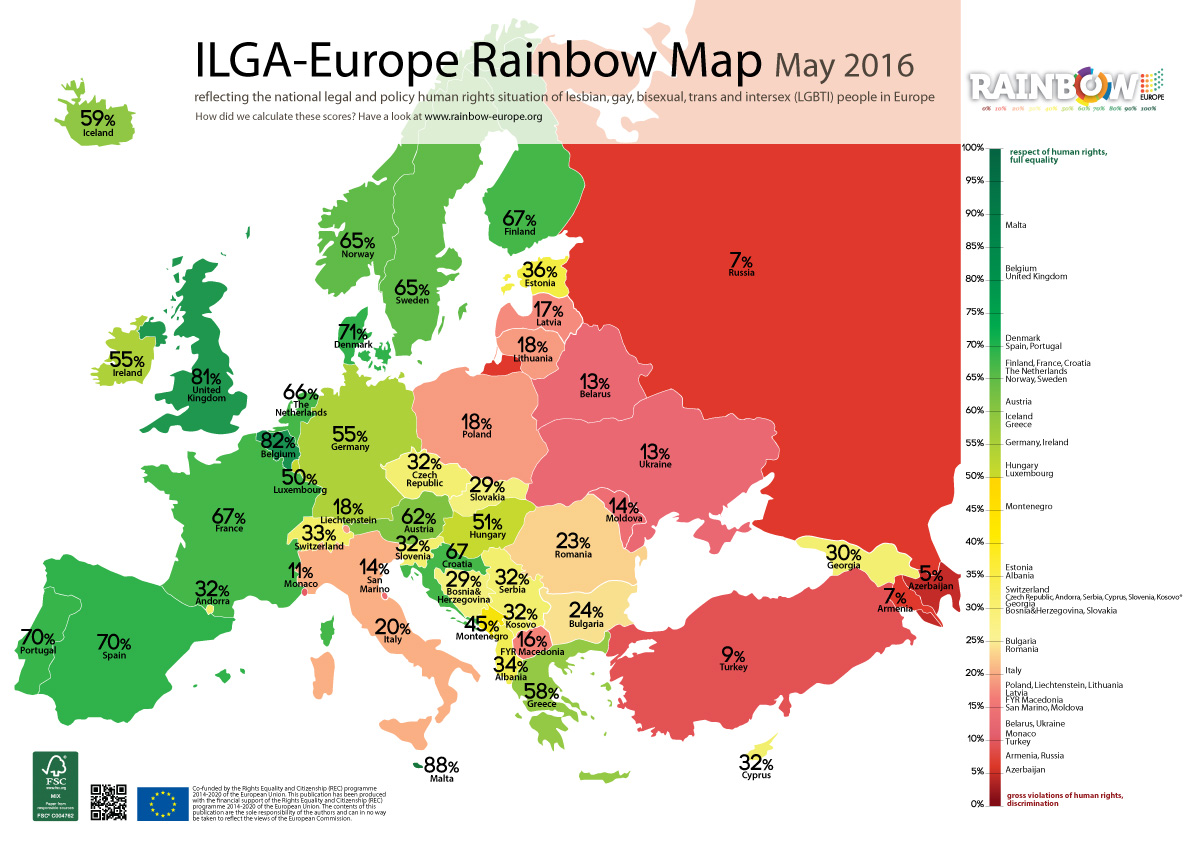
The latest Rainbow Europe Map, which reflects legal and policy developments, confirms that a few countries are still setting new standards for LGBTI equality and being propelled upward on our country ranking as a result.
Rainbow Europe 2016 showcases the current state of play of the laws, policies and practices that affect LGBTI people in Europe today. This year’s benchmarking exercise shows three distinct patterns:
- countries who are demonstrating leadership by introducing standard-setting equality measures;
- countries who are now standing still, including some traditionally seen as progressive;
- and the countries who are actively targeting LGBTI people with restrictive laws.
Unfortunately, too few countries fall in this first category. Speaking at the 2016 launch in front of an audience that included ministers from several European countries, civil society groups and Crown Princess Mary of Denmark, Evelyne Paradis remarked “Contrary to popular belief, LGBTI equality is far from being a done deal in Europe. The picture is actually very mixed at the moment: a lot of the governments that were leading the way on LGBTI equality a few years ago have slowed down their work, especially when it comes to new standards. In ILGA-Europe’s 20th anniversary year, we don’t want to see so many lagging behind. Now is certainly not the time for complacency.”
In the countries at the bottom of our country ranking, LGBTI people and their families are faced with a scenario where their rights are actively being eroded. ILGA-Europe’s latest Rainbow Europe package also contains a stark reminder that Europe is not just damaged by this slowing legislative process. The absence of supportive laws and policies is one thing, the legalisation of oppression is another threat altogether. Regressive laws, targeting both individuals and the work of LGBTI activists and NGOs, are a pernicious and real threat in many European countries.
Rainbow Europe Map and Index 2015
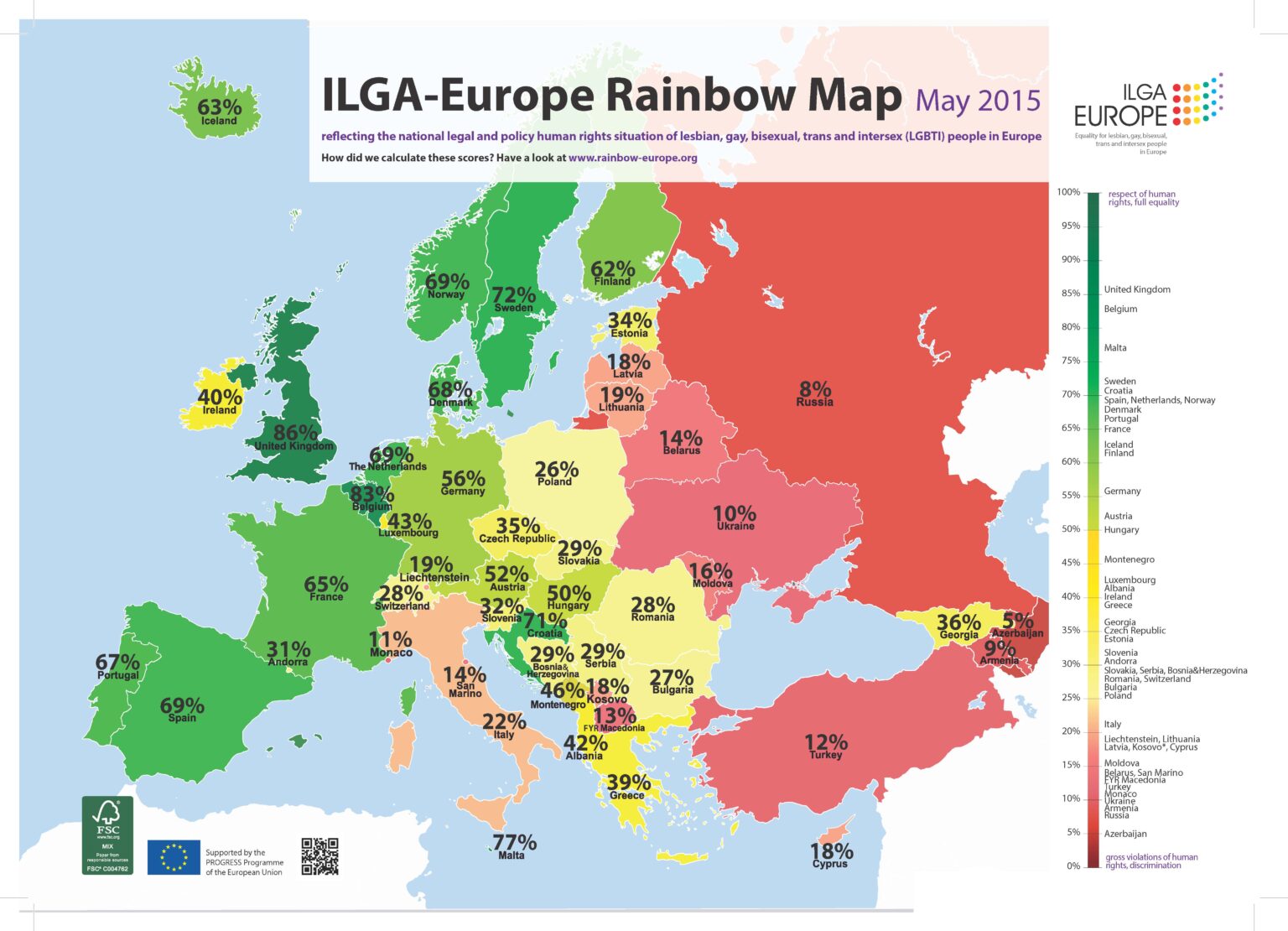
Launched in Montenegro, at the 2015 European IDAHOT Forum celebrating International Day Against Homophobia, Transphobia and Biphobia (17 May), the 2015 Rainbow Europe package highlights the complexity of the current situation for LGBTI people in Europe.
Malta’s rise to 3rd in our rating is undoubtedly the most eye-catching story of the 2015 Rainbow Map. This is an improvement of 8 places (11th in 2014) with an overall score of 77% (57% in 2014). These numbers only tell part of the Maltese story – the substantial legislative and constitutional progress over the past 12 months was the platform for this climb into the Map’s top 3.
At the other end of the spectrum, the difficulties faced by LGBTI activists in Azerbaijan are clear; it lies at the bottom of the 2015 Map with only 5%. Our colour-coded representation of the current legal and policy situation for LGBTI people in Europe ranks 49 countries according to our ultimate benchmark of 100% equality. The fact that no European country has yet reached this magic number, and that the European average is lingering at just 42%, tells European decision makers that there is much work to be done in the coming months.
Rainbow Europe Map and Index 2014
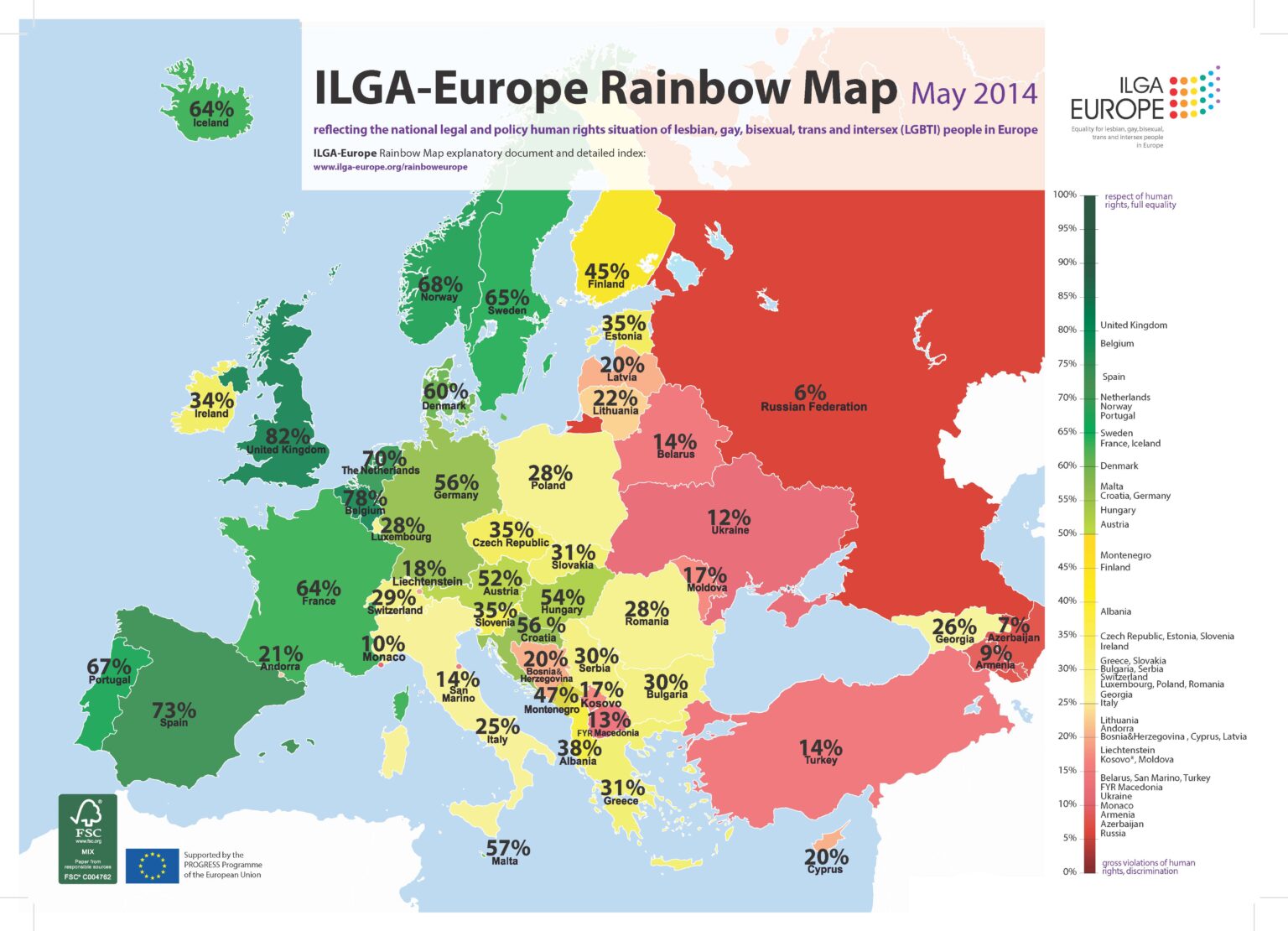
Where legal protection of the human rights of LGBTI people is concerned, there is gradual progress in many European countries. However, Europe as a whole is far from guaranteeing full respect of LGBTI people’s human rights.
The Rainbow Europe Map 2014 shows that the European average on the measure of legal protection is still very low – only 36%. The average for EU countries (46%) does not even reach the half-way mark. This said, the gaps between European countries remains enormous and ranges between the top score of 82% (UK) and the bottom score of 6% (Russia). Most worryingly, 34 out of 49 European countries (including 14 EU Member States) are below 50% mark.
“Advocacy based on solid facts is what we need for advancing the human rights of LGBTI people. ILGA-Europe and its national member organisations have first-hand knowledge of what is going on and share their insights and concerns through the Annual Review and the Rainbow Map. In addition to holding countries accountable for their actions, the Annual Review also gives a critical account of the steps taken by international organisations. It is a valuable tool for a serious debate about the human rights situation of LGBTI persons across Europe.”
Nils Muižnieks, Council of Europe Commissioner for Human Rights
“Mapping, monitoring and analysing homophobia is one of the best ways to expose it and fight it. The 2013 edition of the Annual Review of the Human Rights Situation of LGBTI People and the Rainbow Europe Map are two powerful instruments in this struggle. Members of the European Parliament will continue to use and support the good work of ILGA Europe in achieving a Europe free from prejudice and discrimination.”
Martin Schulz, President of the European Parliament
“Homophobia and transphobia are blatant violations of human dignity and are incompatible with the principles on which the EU is founded. Shockingly however, LGBT people across the EU are still victims of violence, exclusion and discrimination. The knowledge and experience of those working in the field are crucial to draw an accurate picture of the different legal and social realities faced by LGBT people across the EU. Public policies combatting discrimination can only be effective if they are based on practical knowledge. This is why I very much welcome ILGA Europe’s Annual Review, which is an extremely useful tool for those fighting discrimination and promoting equality in Europe. The European Commission is fully committed to this goal.”
Viviane Reding, European Union Commissioner for Justice, Fundamental Rights and Citizenship
Today, same-sex couples can marry in several EU Member States. In a few, they can adopt children and start a family in different ways. Slowly, transgender persons are given equal rights and therefore the opportunity to live the life accordingly with the person on the inside. This is all good developments, but we also see huge differences within Europe. It is with heavy sadness we hear about same-sex couples and rainbow families do not enjoy the same rights as heterosexual couples and their children, not the fundamental EU-right of free movement. LGBT people are not only discriminated, but also subject to violence and hatred around the world and within the EU. The EU might not have competence on all areas, but LGBT people and their families should enjoy fundamental rights and freedoms equally.
ILGA-Europe is an important force in this. The Annual Review and Rainbow Europe Map provide us with useful pointers, which we can use to identify where we need to improve legislation to make life better for all in Europe. We do not only change the world through European legislation, there are other political levels and we should not forget individual responsibility and the need for change in attitudes. I believe information exchange also lead to progress, if we use the information we have. On this ILGA-Europe’s Annual Review is very useful. Fighting homophobia and transphobia has always been a political priority for me. I will continue the fight for the right to love and the right to be yourself. We need to continue this struggle for equality together.”
Cecilia Malmström, European Union Commissioner for Home Affairs
“LGBTI people continue to suffer from violence, hatred and discrimination simply because of their sexual orientation or gender identity. In today’s Europe, founded on the values of equality and non-discrimination, this should not be the case. This is why ILGA-Europe’s Annual Review is a timely reminder of the reality that the LGBTI community continues to face day by day. While the review highlights the many difficulties, it also showcases best practices and recent positive legislative developments as a bridge between civil society, national human rights structures and policy makers on a road to improving the lives of the millions of LGBTI people across Europe.”
Morten Kjærum, Director of the European Union Agency for Fundamental Rights
“The Rainbow Europe Map and the Annual Review of the Human Rights Situation of LGBTI People in Europe have again shown us that despite progress in some countries, there is still a long way to go before all LGBTI people can fully enjoy their rights. Both EU and non-EU countries are responsible for violations of LGBTI people’s human rights, and must be held to account. We expect the EU and Council of Europe to take much bolder action against any member state which fails to meet its obligations.”
Dr. Nicolas J. Beger, Director of Amnesty International European Institutions Office
Rainbow Europe Map and Index 2013
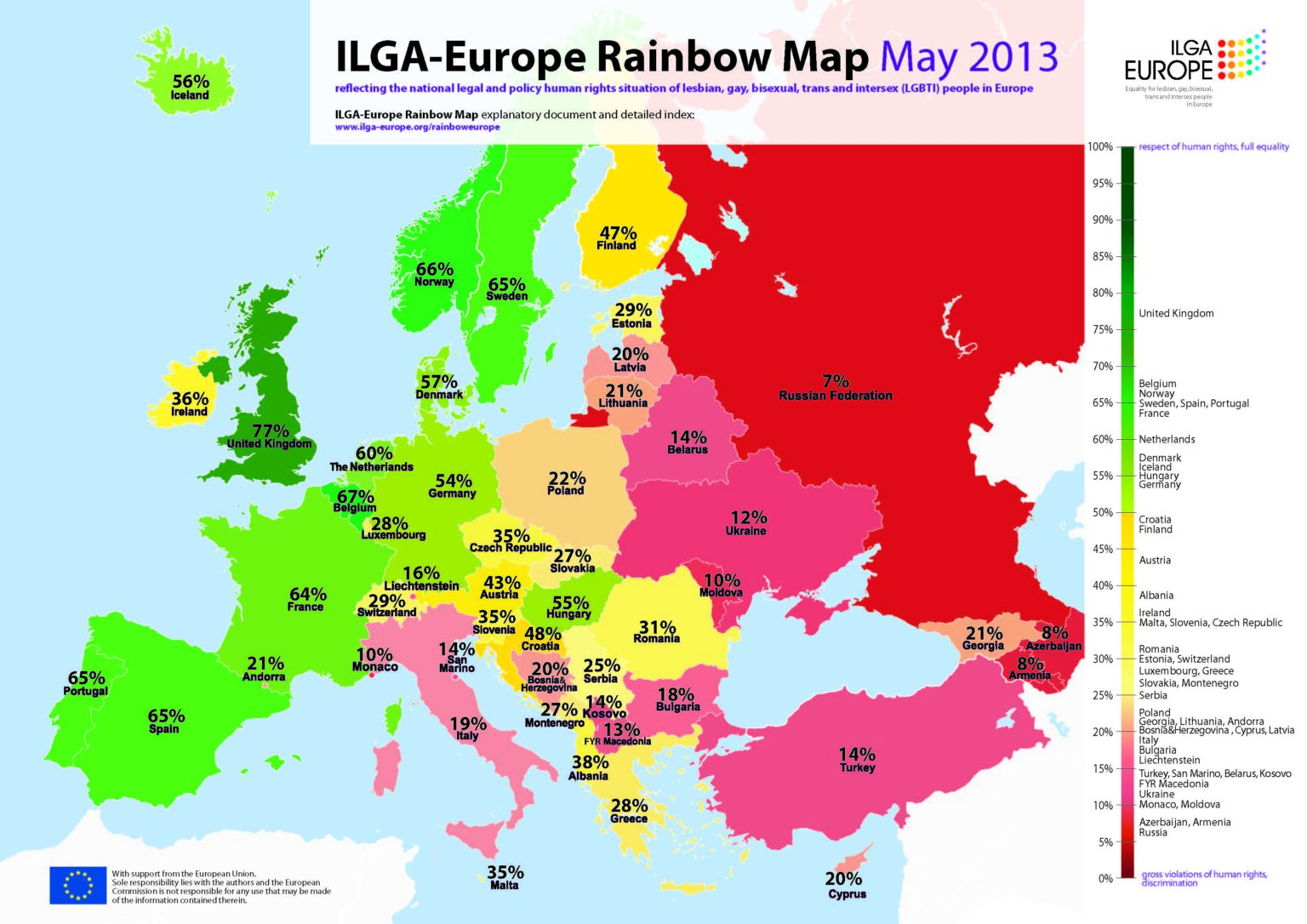
Lately, we heard a lot about marriage equality debate in France and the large public demonstrations by the opponents, or the regressive developments in Russia and Ukraine with the introduction of bans on ‘homosexual propaganda’ and further repression against the LGBTI movement.
Is marriage equality the only criteria we should use to measure equality of LGBTI people in a society? Which European country is a champion of LGBTI equality and which countries are in the ‘red zone’? What are the main European trends: both in terms of achievements and shortcomings? Are the European institutions doing enough? Is Europe moving forward or taking steps back?
The Rainbow Europe package will provide the answers to all the above mentioned questions. It will give an overall picture of the current state of play of the human rights of LGBTI people in Europe.
Rainbow Europe Map and Index 2012
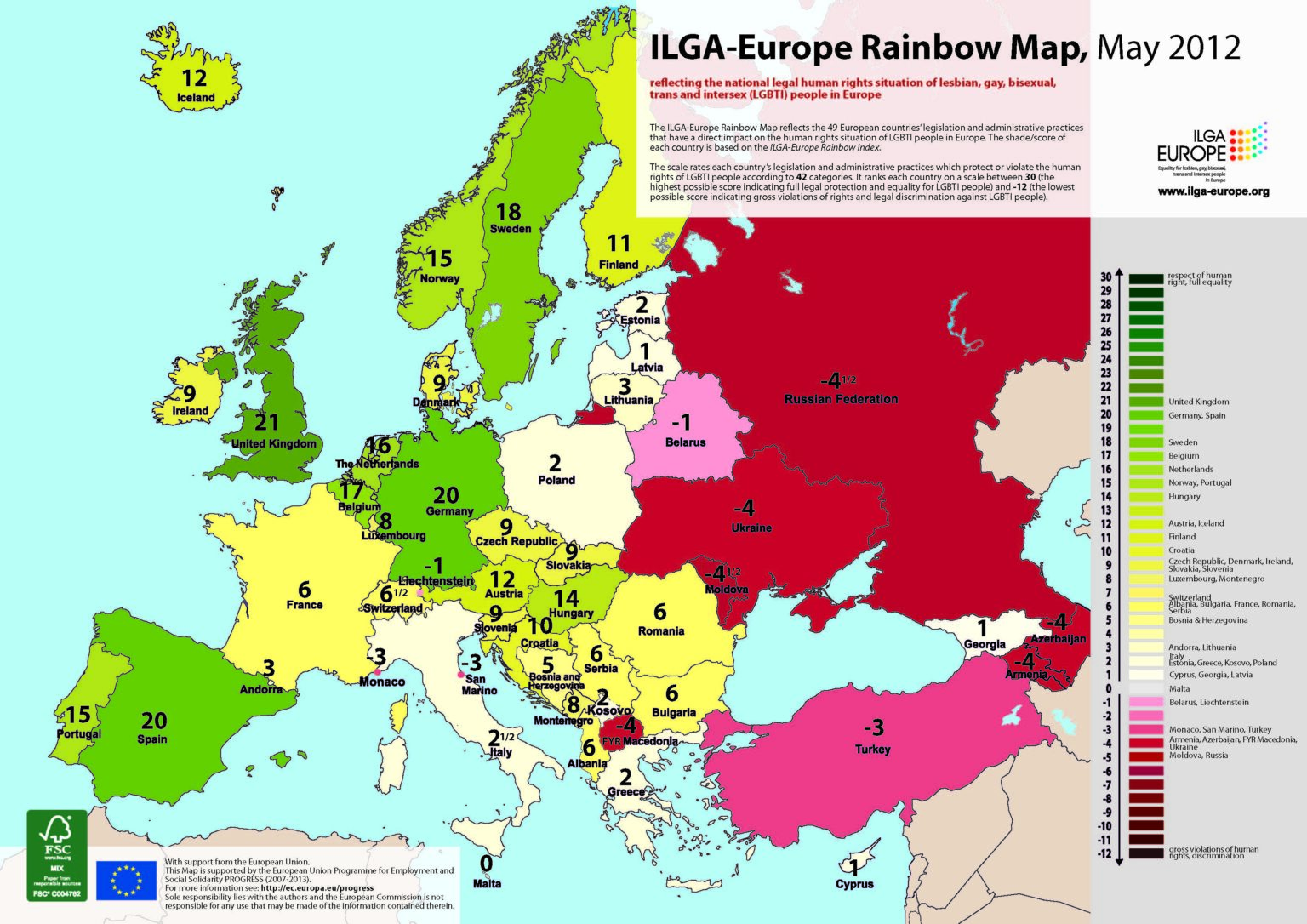
ILGA-Europe Rainbow Map 2012 reflects the national legal human rights situation of LGBTI people in a simple format. The Rainbow Map ranks all European countries according to their legislation and administrative practices that have direct impact on the human rights situation of LGBTI people
From a legal perspective, the ILGA-Europe Rainbow Map shows that none of the countries in Europe can claim to provide full legal equality for LGBTI people. The five highest scoring countries – out of the maximum of 30 points – are:
• United Kingdom (21 points)
• Germany and Spain (20 points each)
• Sweden (18 points)
• Belgium (17 points)
10 countries are in the negative zone and do not meet the basic requirements of human rights standards:
• Moldova and Russia (-4.5 points each)
• Armenia, Azerbaijan, FYR Macedonia and Ukraine (-4 points each)
• Monaco, San Marino and Turkey (-3 points each)
• Belarus and Liechtenstein (-1 point each)
A simple fact remains: on average, the level of legal equality continues to be very low in most countries.
Rainbow Europe Map and Index 2011
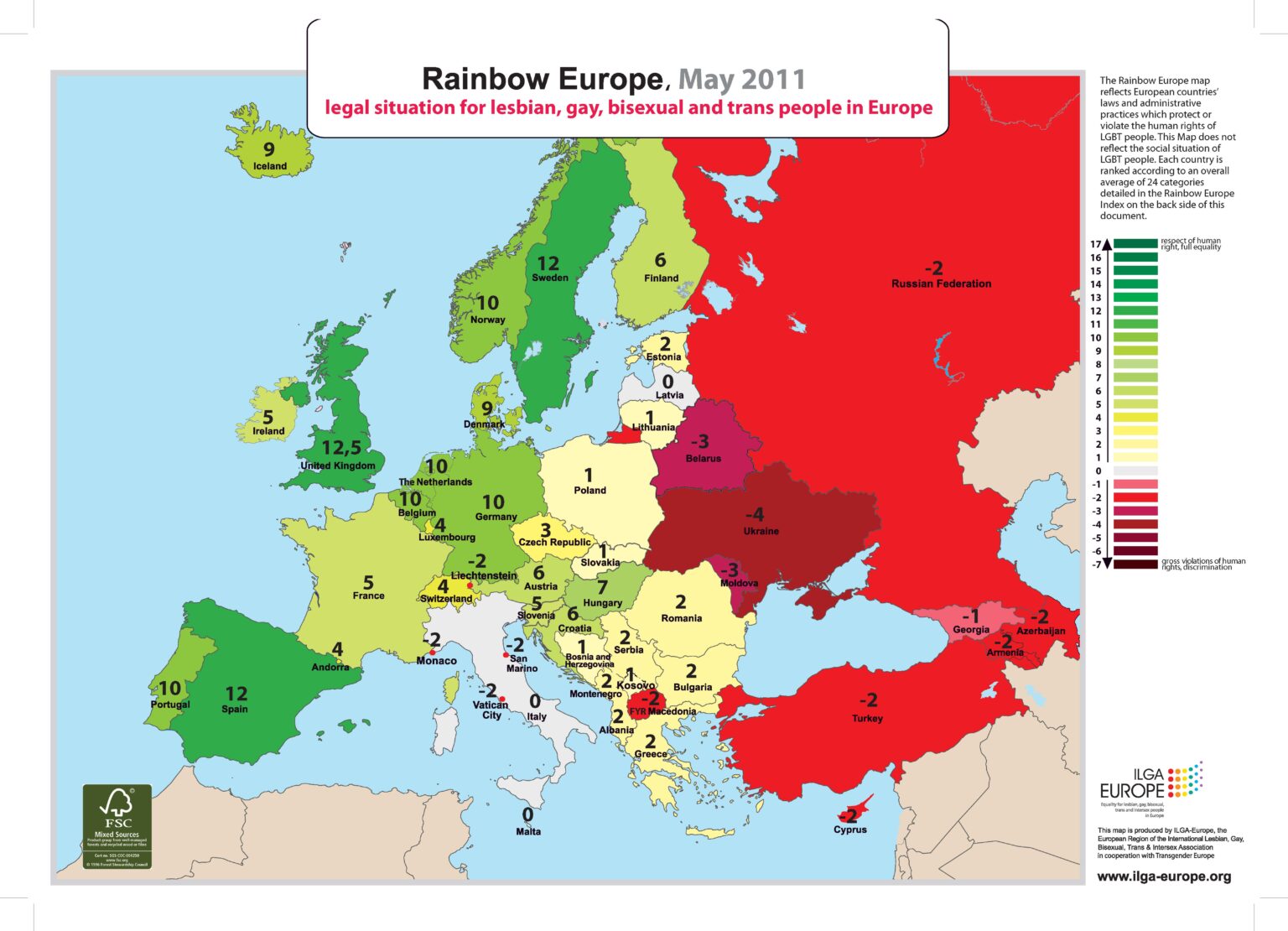
On 17 May, the International Day against Homophobia and Transphobia is being marked. Every year on this day ILGA-Europe looks at progress made by European countries towards respecting human rights and ensuring full legal equality of lesbian, gay, bisexual and trans people (LGBT) by publishing Rainbow Europe Map and Index.
The main trends observed this year are that:
- None of the countries in Europe can claim to provide for full legal equality for LGBT people. Every country in Europe still has work to do to achieve LGBT equality – even those which scored the highest on the Index (the United Kingdom (12,5 points) or Sweden and Spain (12 points))
- 14 countries (including 1 EU Member State) are in the ‘red zone’: gross violations of human rights and discrimination are taking place
- There are significant variations between countries in Europe: while some have progressed in the past year (e.g. Germany, Portugal), many others are not advancing towards greater recognition of rights (e.g. Cyprus, Italy, Latvia, Malta, Turkey, Ukraine), while in others (e.g. Lithuania, Hungary) we observe the risks of regress
- Many EU Member States are either around or below average when it comes to respecting human rights and ensuring legal equality of LGBT people. This is particularly worrying considering that the overall European average is very poor.
ILGA-Europe’s Rainbow Europe Map and Index rates each European country’s laws and administrative practices according to 24 categories and ranks them on a scale between 17 (highest score: respect of human rights and full legal equality of LGBT people) and -7 (lowest score: gross violations of human rights and discrimination of LGBT people). This is the first time the Map and the Index reflect categories on issues affecting trans people.
Rainbow Europe Map and Index 2010
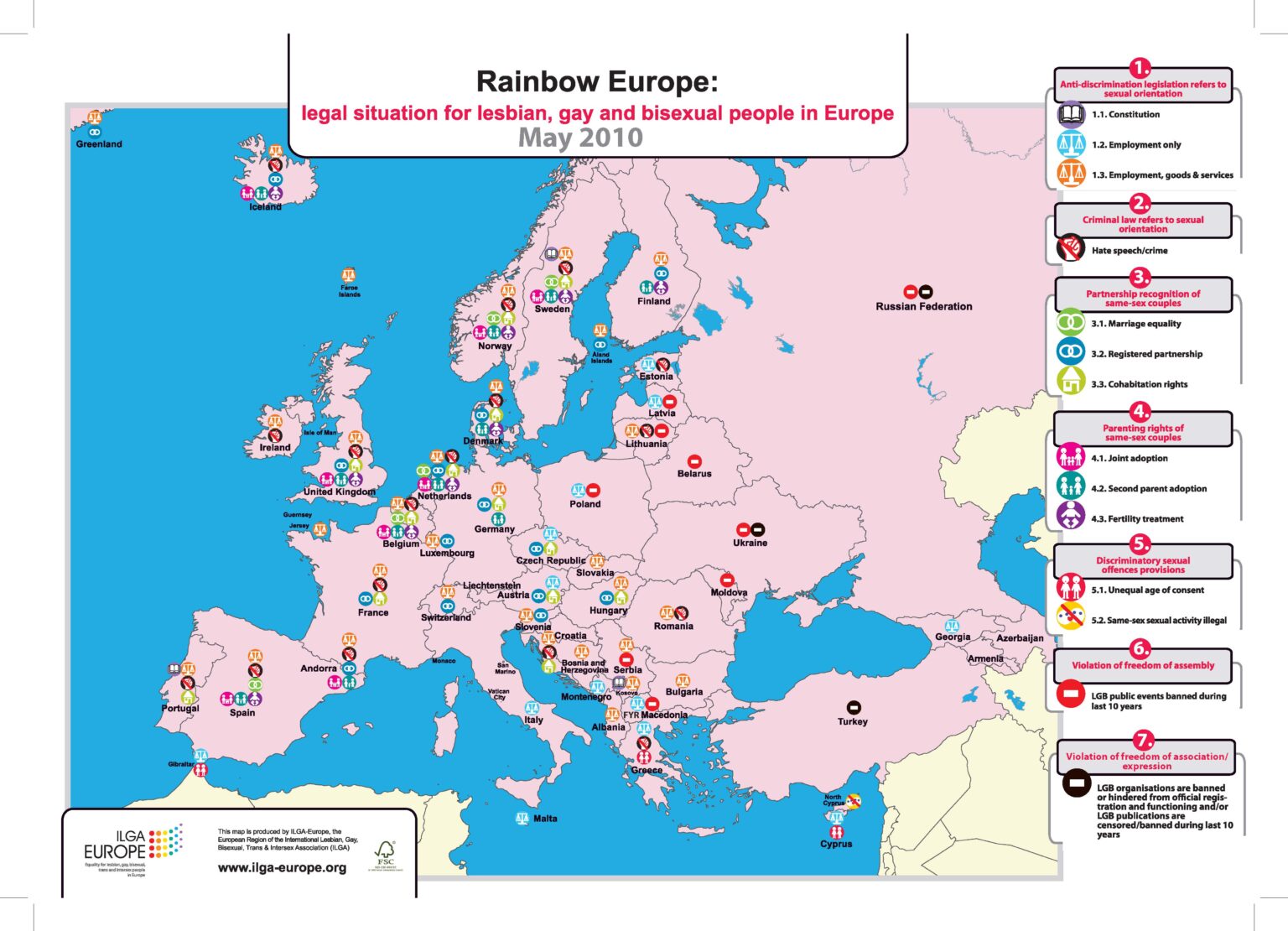
The map reflects European countries’ legislation which protects the human rights of and ensures equality for LGB people as well as laws and practices which discriminate against and violates the human rights of LGB people.
The rating places a country on a scale between 10 (maximal positive score) and -4 (minimal negative score) and is an average of possible positive and negative points.
Positive points are awarded to a country which has
- legislation protecting from discrimination on the grounds of sexual orientation,
- recognising same-sex partnership,
- parenting rights of same-sex partners,
- recognising homophobia in hate speech/crime legislation.
The negative points are awarded to the countries which
- have law banning same-sex sexual acts
- have unequal age of consent
- violated the rights of LGB people to peaceful assembly and freedom of association.
The Map and Index do not reflect the situation for trans and intersex people in Europe. ILGA-Europe is working with Transgender Europe on identifying the categories and data collection which will enable to have such an overview. We expect to produce such map and index on trans and intersex issue in 2011.
Rainbow Europe Map and Index 2009
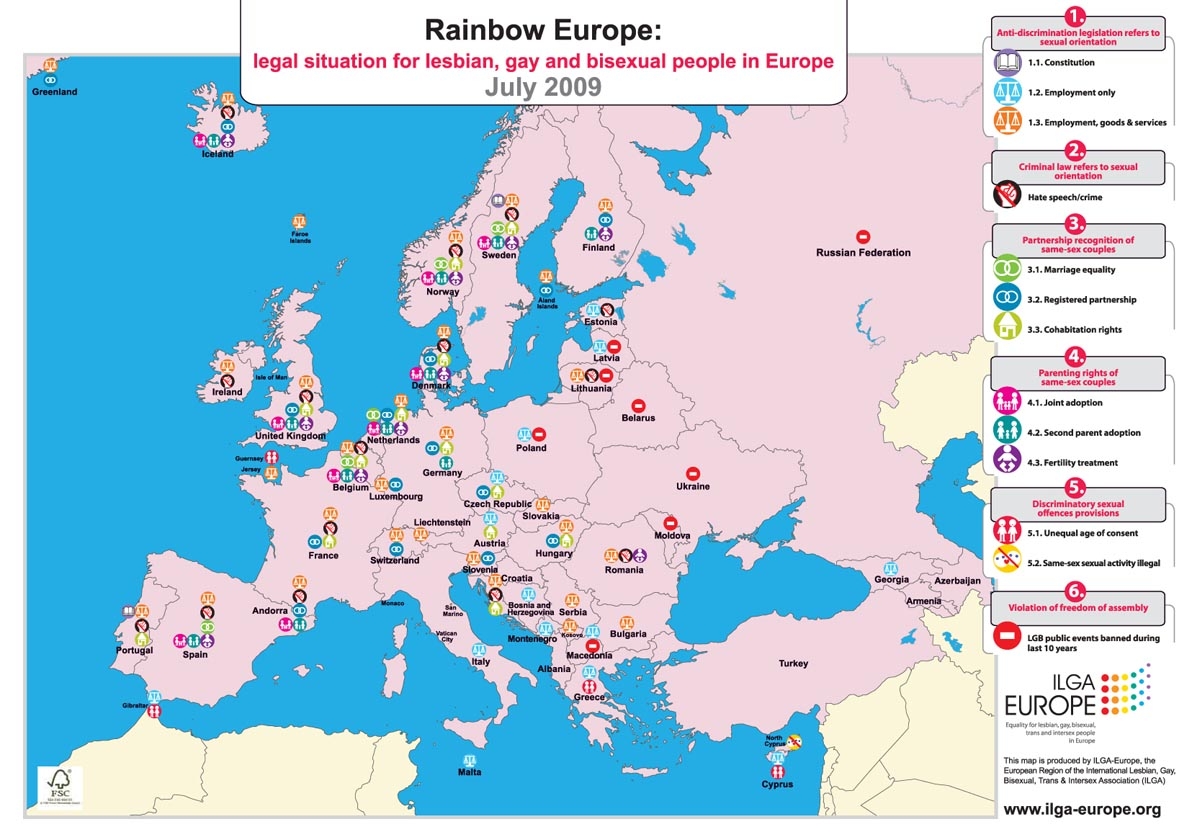
Prior to OutGames and its International Human Rights Conference in Copenhagen in the end of this month where ILGA-Europe take part, we published a map of Europe reflecting the legal situation for lesbian, gay and bisexual people.
The ‘Rainbow Europe’ map reflects legal advanced such as protection from discrimination, recognition of LGB families and parenting rights, inclusion of sexual orientation in hate speech/crime legislation. The map also highlights the ‘darker’ corners of ‘Rainbow Europe’ where there is still criminalisation of consenting same-sex acts, unequal age of consent and there Pride events have been banned during last 10 years.
Summary of the mapped legal situation for lesbian, gay and bisexual people in Europe:
Advances:
- 2 countries’ constitutions refers to sexual orientation in their anti-discrimination provisions
- 13 countries and 1 territory bans sexual orientation discrimination in employment
- 25 countries and 5 territories ban sexual orientation discrimination in employment, access to good and services
- 15 countries refer to sexual orientation in hate speech/crime legislation
- 5 countries allow same-sex partners to marry
- 13 countries and 2 territories allow same-sex partners to register their partnerships
- 13 countries recognise cohabitation of same-sex partners
- 9 countries entitle same-sex partners to apply for joint adoption
- 11 countries allow that same-sex partners can adopt each other biological child of child(ren)
- 10 countries provide fertility treatment for lesbian couples
Spots of discrimination and inequality:
- 2 countries and 3 territories still have unequal age of consent for all sexual acts
- 1 territory still criminalises consenting sexual acts between adult men
- 8 countries banned LGBT public events during the last 10 years